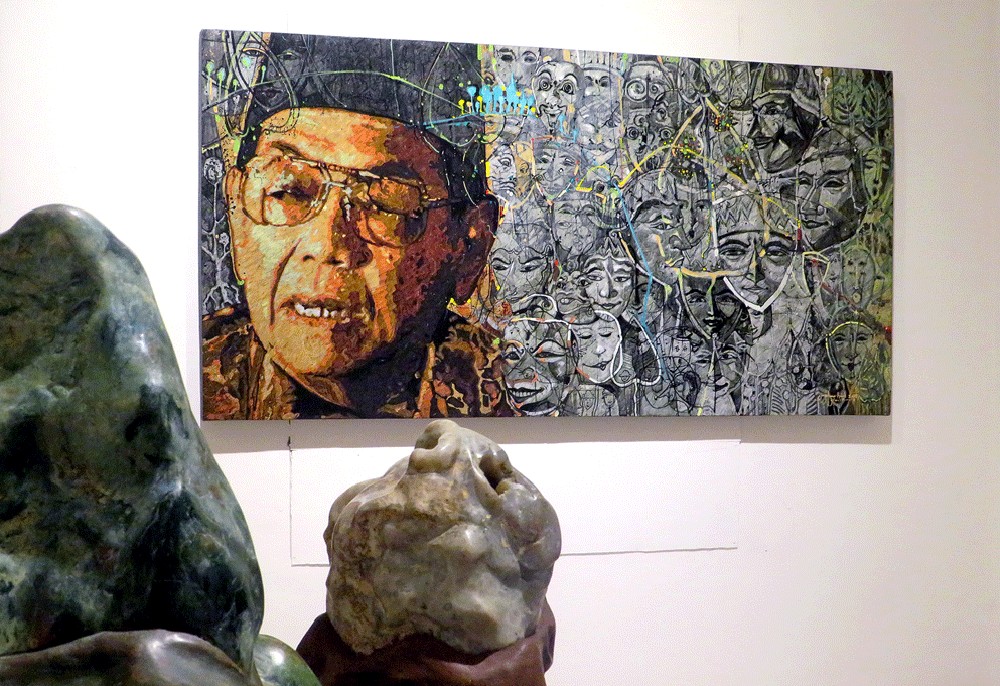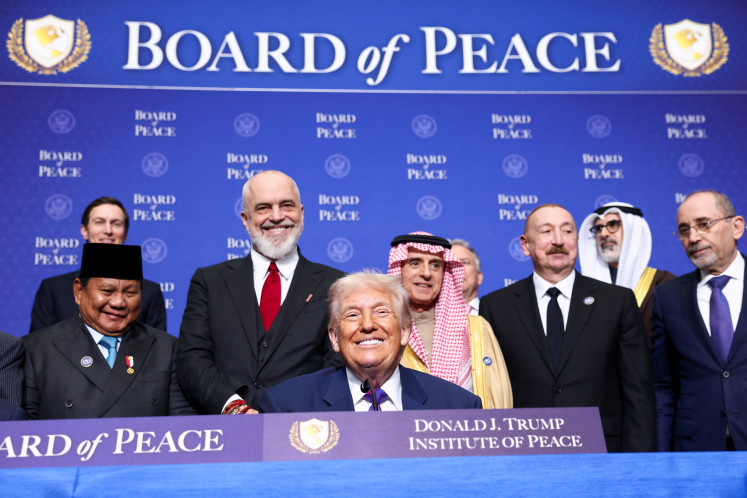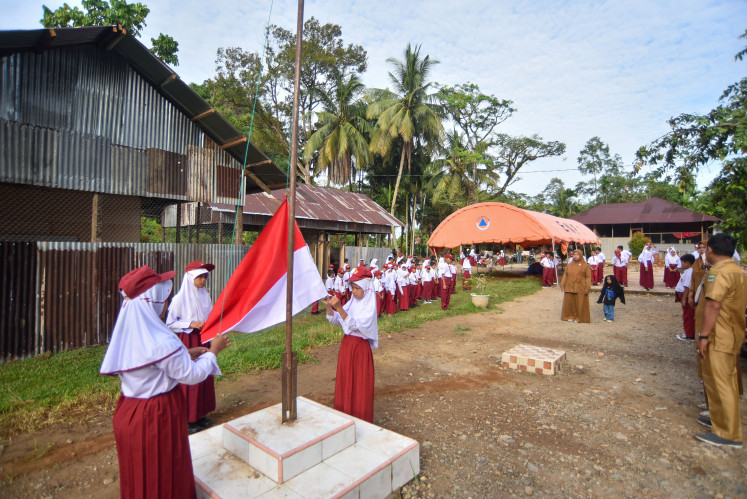Popular Reads
Top Results
Can't find what you're looking for?
View all search resultsPopular Reads
Top Results
Can't find what you're looking for?
View all search resultsImpeaching Gus Dur, a blind but visionary president
Gus Dur will always be remembered as a controversial president who often made erratic decisions but which were intended “for the good of Indonesia”.
Change text size
Gift Premium Articles
to Anyone
This month, 20 years ago, Abdurrahman “Gus Dur” Wahid was impeached as the country’s fourth president.
Gus Dur will always be remembered as a controversial president who often made erratic decisions but which were intended “for the good of Indonesia”. He was a Muslim cleric who enlightened not only his followers but people of other faiths and atheists. A sincere defender of the minorities and the oppressed, he never fell short of jokes. He was also a leader who, with his unique ways, “normalized” the military from a super body into a defense force that directed guns at external enemies, rather than its own people.
The picture of the impeached president Gus Dur, waving to his supporters on the Merdeka Palace veranda on July 23, 2001 will always be phenomenal. Wearing trunks and a short-sleeved shirt, he was escorted by his adjutant Col. Sukirno and his second daughter Yenny Wahid to his official residence.
The People’s Consultative Assembly (MPR) impeached the blind president that day, only 21 months after installing him as the head of state on Oct. 20, 1999. His vice president Megawati Soekarnoputri took over from him. His friend, the then-United States deputy defense secretary and former United States ambassador to Indonesia, arranged his exit visit for a medical trip to the US.
Among the MPR’s reasons for impeaching Gus Dur included his erratic leadership and government. During his brief term, he sacked no less than 18 ministers and easily changed policies upon the advice of his whisperers, or inner circle friends.
But the MPR also should blame itself in the first place. It had elected a blind politician and Muslim cleric simply because it disliked Megawati, a daughter of founding president Sukarno. The politicians went so far as seeking a religious justification to foil her bid for presidency. Ironically, when Megawati finally was installed as president, her outspoken critic, Hamzah Haz, accepted a deal to be her vice president.
Gus Dur became the president after 15 years leading Nahdlatul Ulama (NU), the country’s largest Muslim organization, and after surviving repeated attempts by then-president Soeharto to oust him from NU.
At that time the Indonesian economy was in an extremely slow process of recovery from the impacts of the Asian financial crisis and the fall of Soeharto in May 1998. Indonesia, the sick man of Asia, was on the brink of becoming a failed state.
The Unitary State of the Republic of Indonesia (NKRI) was nearly collapsing. International media predicted that Indonesia would soon follow in the footsteps of the Soviet Union and Yugoslavia. Many regions demanded wide-ranging autonomy, apparently because they were partly influenced by the independence of East Timor from Indonesia.
Sectarian conflicts between Muslims and Christians erupted in Ambon, the capital city of Maluku, and Poso in Central Sulawesi shortly after his inauguration. It was hard to accept the military’s explanation at that time that they had nothing to do with the prolonged conflicts, which claimed thousands of lives.
Indonesia was chaotic at that time. And with all respects, Gus Dur was blind, so he was heavily dependent on other people to read official documents for him and show him where to sign official letters. It explained why he was so erratic in governing the country.
During his early presidency, many world leaders and international media put high hopes on his ability to accelerate democratization in the world’s largest Muslim nation.
Shortly after his inauguration, president Gus Dur made frequent overseas trips. When the Garuda chartered plane arrived early morning in November 1999 at Andrews Air Force Base in Maryland, nobody on board, including Gus Dur, held a US visa. When I had a chance to ask the president what would happen if the US rejected the Indonesian delegation, his answer was very typical Gus Dur: ”We just go back home”. We got a visa on arrival at the airport.
President Bill Clinton warmly welcomed Gus Dur at the Oval Office. Clinton was often heard roaring with laughter during their conversation. In their early conversation reporters were allowed to join them for a few minutes. Gus Dur expressed admiration for the Presidential Oval Office, and Clinton laughed. Clinton apparently realized that his Indonesian guest tried to tease him because of the Clinton-Monica Lewinsky scandal.
Gus Dur also visited several world leaders, including Japanese prime minister Keizo Obuchi and Saudi King Fahd, with whom he shared many funny stories.
In his meeting with Obuchi in Tokyo in November 1999, the prime minister began their conversation in English to congratulate his guest’s election as president. “Your Excellency, congratulations for your election as the president of Indonesia [Japanese often pronounce L as R],” said the prime minister.
Gus Dur responded with a smile. “I have a problem with my erection,” Gus Dur told reporters his reply to his host.
Saudi King Fahd received Gus Dur in January 2000 in Riyadh. According to Gus Dur, Saudi Arabians were grateful to him, because for the first time they could see their king’s teeth. It was King Fahd’s first laughter in public.
Gus Dur was very good in making fun of himself, including his poor sight. His stock of jokes seemed endless. Many books about him have been published, which are entertaining because of his jokes.
So what is his biggest legacy for his nation?
For minority groups, Gus Dur was an icon of equality. He abolished decades-long racial discrimination against the Chinese, He declared Imlek, the Chinese New Year, a public holiday.
When he visited Jayapura in December 1999, he renamed the province Papua. He respected the Papuans and their dignity.
He also apologized to victims of the 1965 Communist purge and for Indonesia’s occupation of East Timor in 2000.
Many civil servants started to enjoy a decent salary after Gus Dur raised their basic salary by 270 percent, the highest in Indonesian history.
Gus Dur passed away in 2009 at the age of 69. He was a blind but visionary president.
***
The writer is senior editor of The Jakarta Post.










